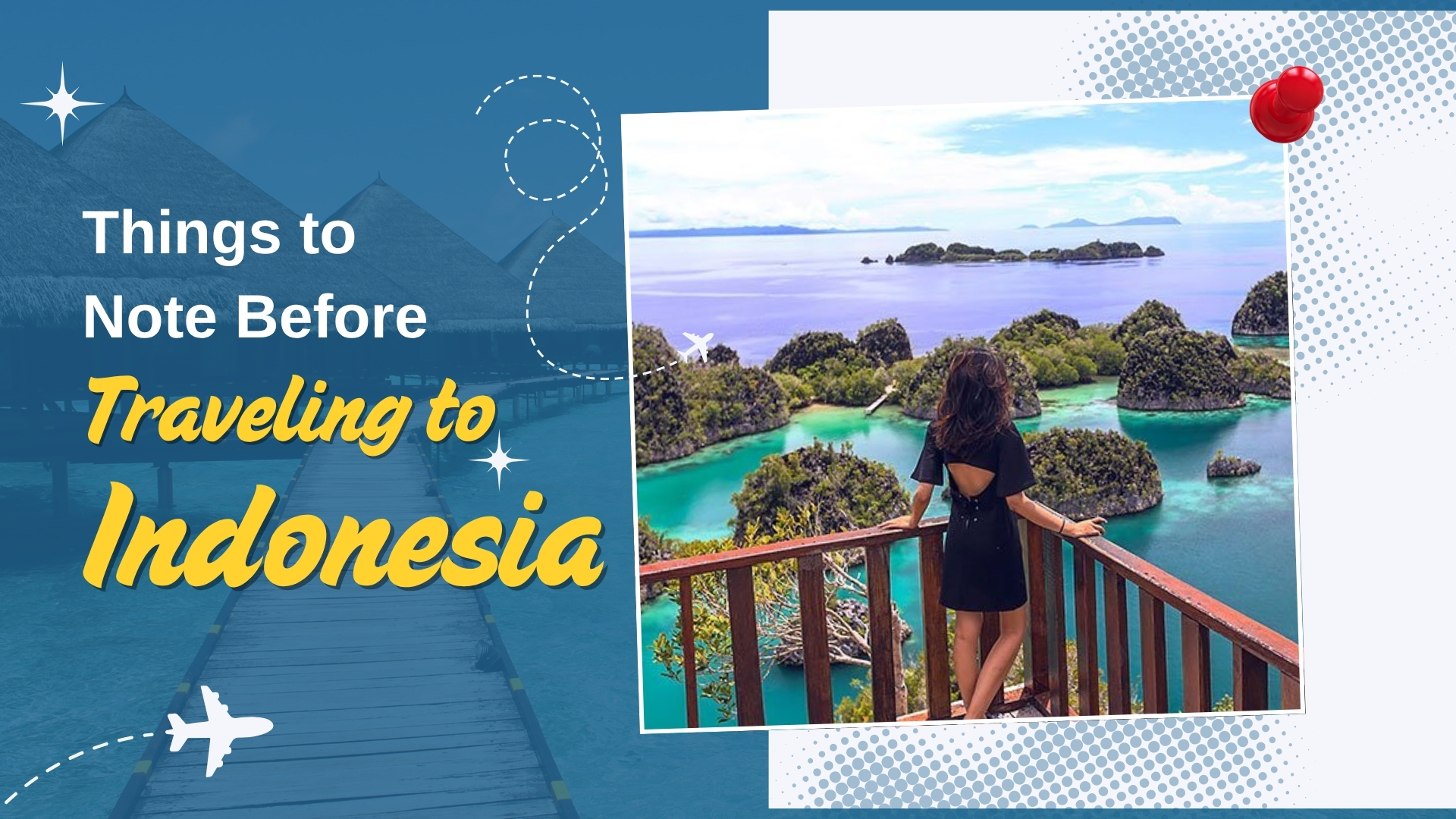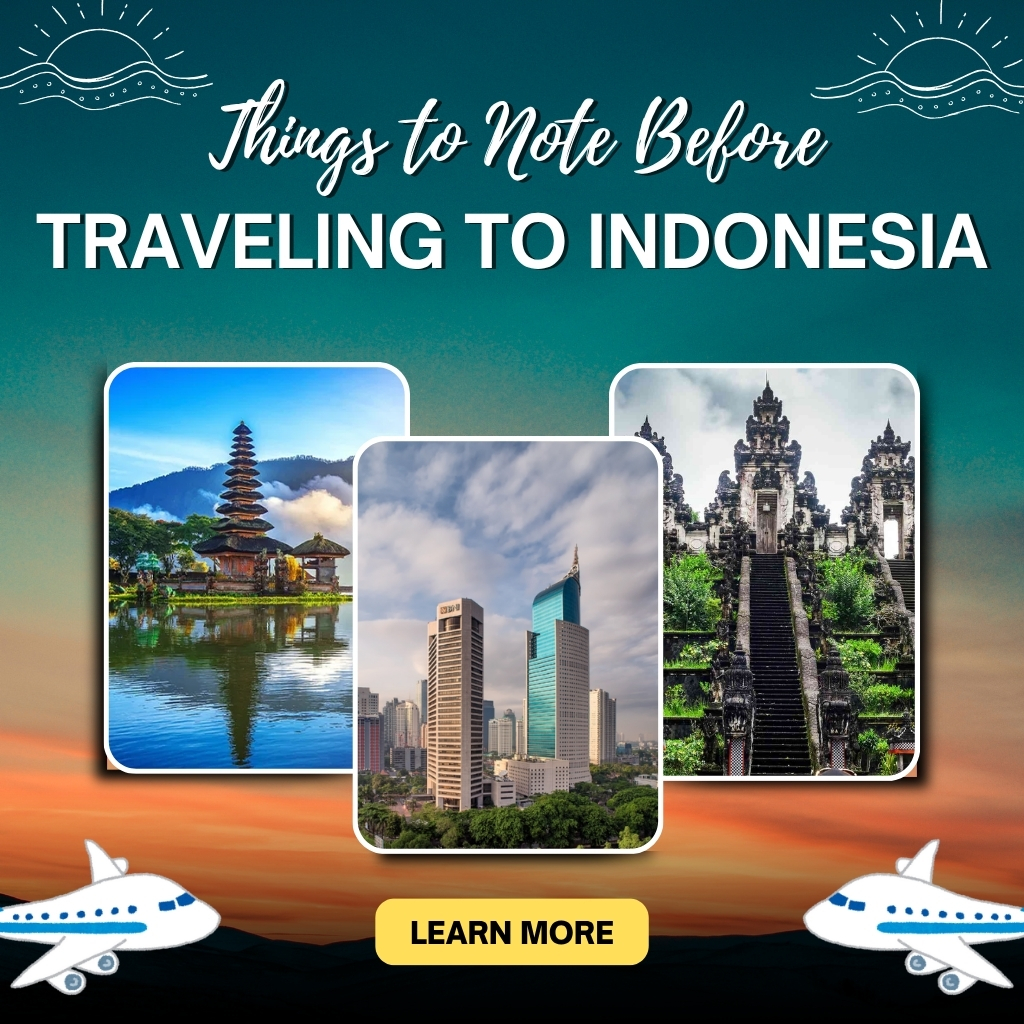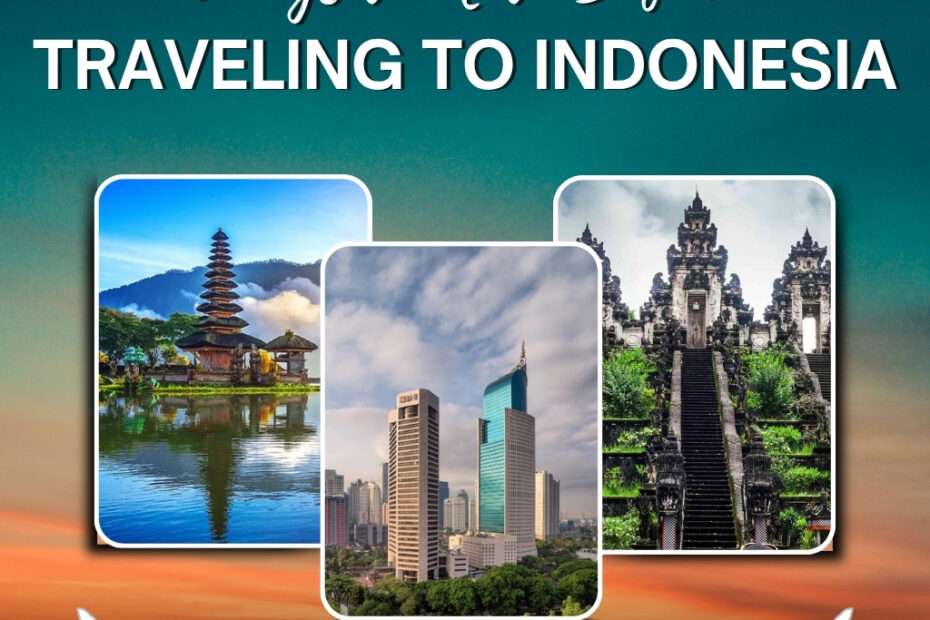Indonesia, the world’s largest archipelago, is a captivating blend of diverse cultures, breathtaking landscapes, and vibrant traditions. From the lush rice terraces of Bali to the bustling streets of Jakarta, Indonesia offers an adventure for every traveler. However, as with any international destination, understanding the local customs, regulations, and practicalities is crucial for a safe and enjoyable trip.
Whether you’re a first-time visitor or a seasoned explorer, knowing the important things to note before traveling to Indonesia can make all the difference. This comprehensive guide will walk you through everything you need to prepare—covering travel documents, health and safety, cultural etiquette, money matters, transportation, and more. Read on to ensure your Indonesian adventure is memorable for all the right reasons!
Essential Things to Note Before Traveling to Indonesia

1. Entry Requirements and Visas
Visa Policy
Indonesia’s visa policy varies depending on your nationality and the purpose of your visit. Here’s what you need to know:
- Visa-Free Entry: Citizens of over 160 countries can enter Indonesia visa-free for up to 30 days for tourism purposes.
- Visa on Arrival (VoA): Some nationalities can obtain a VoA at major airports and seaports, valid for 30 days and extendable once.
- E-Visa: Indonesia offers an e-VOA (electronic visa on arrival) for certain countries, which can be applied for online before arrival.
- Longer Stays: For business, work, or longer stays, you’ll need to apply for the appropriate visa in advance.
Tip: Always check the latest visa requirements on the official Indonesian immigration website or with your local embassy, as policies can change.
Passport Validity
- Your passport must be valid for at least six months from your date of entry.
- Ensure you have at least one or two blank pages for entry and exit stamps.
2. Health and Safety Precautions
Vaccinations and Health Advice
- Recommended Vaccinations: Hepatitis A and B, Typhoid, Tetanus, and Japanese Encephalitis (for rural areas or long stays).
- COVID-19 Requirements: Check for the latest COVID-19 entry requirements, as these may change.
- Malaria and Dengue: Some regions, especially rural or jungle areas, have a risk of malaria and dengue fever. Use mosquito repellent and consider antimalarial medication if traveling to affected areas.
Travel Insurance
- Comprehensive travel insurance is highly recommended. Ensure it covers medical emergencies, theft, and trip cancellations.
Food and Water Safety
- Drink bottled or filtered water only.
- Avoid ice in drinks unless you’re sure it’s made from purified water.
- Eat freshly cooked food and be cautious with street food if you have a sensitive stomach.
3. Cultural Etiquette and Local Customs
Dress Code
- Indonesia is predominantly Muslim, especially on islands like Java and Sumatra.
- Dress modestly in public places—cover shoulders and knees, especially when visiting religious sites.
- In Bali and touristy areas, attire is more relaxed, but respect local norms.
Greetings and Social Norms
- A handshake is common, but use your right hand only.
- Avoid touching someone’s head, as it’s considered sacred.
- Remove shoes before entering homes and some temples.
Religious Observances
- Be mindful of Ramadan and other religious events; some restaurants may close or have limited hours.
- During prayer times, respect the local customs and avoid loud behavior near mosques.
4. Money Matters
Currency and Payments
- The official currency is the Indonesian Rupiah (IDR).
- Cash is king, especially in rural areas and small businesses.
- Credit cards are widely accepted in cities and tourist destinations, but always carry some cash for markets, transport, and small purchases.
ATMs and Money Exchange
- ATMs are widely available in cities and airports, but may be scarce in remote areas.
- Use authorized money changers or banks for currency exchange; avoid street vendors.
Tipping
- Tipping is not mandatory but appreciated. In restaurants, a 5-10% tip is customary if service charge isn’t included.
5. Transportation and Getting Around
Domestic Flights
- Indonesia is vast, with over 17,000 islands. Domestic flights are often the fastest way to travel between islands.
- Book flights in advance, especially during peak seasons.
Public Transport
- Buses and Trains: Affordable and reliable in cities and between major towns.
- Ojeks: Motorcycle taxis are popular for short distances.
- Ride-Hailing Apps: Gojek and Grab are widely used for cars and scooters.
Ferries and Boats
- Ferries connect major islands; schedules can be irregular, so plan ahead.
- Safety standards may vary—choose reputable operators.
Driving in Indonesia
- International Driving Permit (IDP) required.
- Traffic can be chaotic, especially in Jakarta and Bali.
- Drive on the left side of the road.
6. Communication and Connectivity
Language
- Bahasa Indonesia is the official language.
- English is spoken in tourist areas, but learning a few basic Indonesian phrases is helpful.
Internet and SIM Cards
- SIM cards are inexpensive and widely available at airports and convenience stores.
- Major providers: Telkomsel, XL Axiata, Indosat.
- Wi-Fi is common in hotels, cafes, and restaurants.
7. Climate and Packing Tips
Weather
- Indonesia has a tropical climate—hot and humid year-round.
- Two main seasons: dry (April–October) and wet (November–March).
- Pack lightweight, breathable clothing, rain gear for the wet season, and swimwear for beaches.
Packing Essentials
- Mosquito repellent
- Sunblock and hat
- Reusable water bottle
- Power adapter (Indonesia uses type C and F plugs, 230V)
8. Safety and Security
Common Scams
- Beware of taxi scams—use reputable companies or ride-hailing apps.
- Watch out for pickpockets in crowded areas.
- Avoid illegal drugs—penalties are severe.
Natural Disasters
- Indonesia is prone to earthquakes, volcanic eruptions, and tsunamis.
- Familiarize yourself with emergency procedures and local alerts.
9. Responsible Travel
- Respect local wildlife and marine life—don’t touch coral or feed animals.
- Support local businesses and artisans.
- Reduce plastic use and dispose of waste responsibly.
Comparison Table: Key Things to Note Before Traveling to Indonesia
| Aspect | Key Points | Tips for Travelers |
|---|---|---|
| Visa & Entry | Varies by nationality; check requirements | Apply online or at arrival if eligible |
| Health & Safety | Vaccinations, mosquito protection, travel insurance | Carry repellent, bottled water |
| Cultural Etiquette | Modest dress, respect religious sites, remove shoes | Learn basic Bahasa Indonesia |
| Money Matters | Use Rupiah, cash preferred, ATMs available | Exchange at banks, carry small bills |
| Transportation | Domestic flights, ferries, ride-hailing apps | Book in advance, use Gojek/Grab |
| Communication | Bahasa Indonesia, English in tourist areas, local SIM cards | Buy SIM at airport |
| Climate & Packing | Tropical, wet/dry seasons, lightweight clothing | Bring rain gear, sunblock |
| Safety & Security | Scams, natural disasters, strict drug laws | Stay alert, follow local news |
FAQ

What is the best time to visit Indonesia?
The best time to visit Indonesia is during the dry season, from April to October, when the weather is sunny and ideal for outdoor activities.
Do I need a visa to visit Indonesia?
Many nationalities can enter Indonesia visa-free for up to 30 days. Others may require a visa on arrival or an e-visa. Always check the latest requirements for your country.
Is Indonesia safe for tourists?
Indonesia is generally safe, but like any destination, travelers should be cautious of petty crime, scams, and natural disasters. Follow local advice and take standard precautions.
Can I use credit cards in Indonesia?
Credit cards are accepted in hotels, restaurants, and shops in major cities and tourist areas. However, cash is preferred in rural areas and for small transactions.
What should I wear in Indonesia?
Dress modestly, especially in Muslim-majority areas. Lightweight, breathable clothing is best due to the tropical climate. Cover shoulders and knees when visiting religious sites.
How do I get around in Indonesia?
Domestic flights, ferries, buses, trains, and ride-hailing apps like Gojek and Grab are common ways to travel. Renting a scooter is popular in Bali, but traffic can be challenging.
What language is spoken in Indonesia?
Bahasa Indonesia is the official language. English is widely spoken in tourist areas, but learning a few local phrases is appreciated.
Conclusion
Traveling to Indonesia promises a rich tapestry of experiences—stunning landscapes, diverse cultures, and warm hospitality. By understanding the essential things to note before traveling to Indonesia, you’ll be well-prepared to navigate the country’s unique customs, stay safe, and make the most of your adventure.
Key Takeaways:
- Check and fulfill visa and entry requirements before departure.
- Prioritize health and safety with vaccinations, insurance, and food precautions.
- Respect local culture and dress codes, especially in religious areas.
- Manage your money wisely—carry cash and use authorized exchange services.
- Plan your transportation and connectivity needs in advance.
- Pack for the tropical climate and prepare for both wet and dry seasons.
- Stay aware of safety tips and travel responsibly.
With these tips in mind, you’re ready to explore Indonesia’s wonders—whether you’re diving in Raja Ampat, hiking volcanoes in Java, or soaking up the sun in Bali. Selamat jalan (happy travels)!
